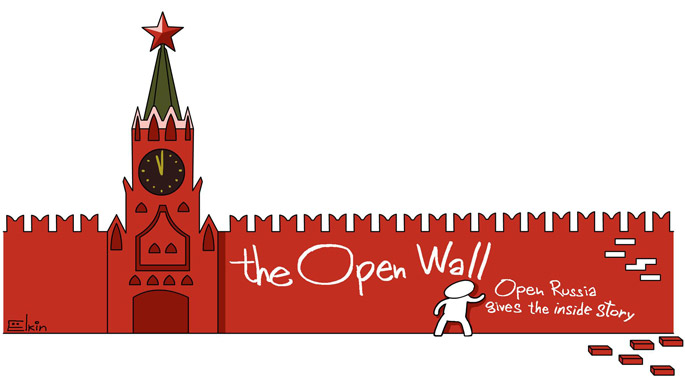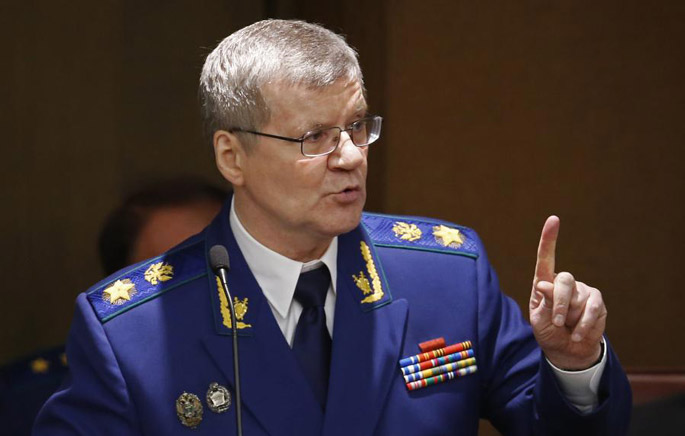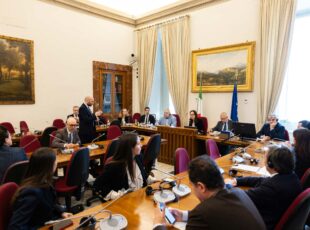Witness for the Prosecution

Witness for the Prosecution
Russia has a new, old Prosecutor General. The incorruptible Yuri Chaika will spend the next five years in a post he has occupied for the past decade.

Sergey Orlov
Vladimir Putin has once again made it clear that if an influential official possesses certain crucial virtues – absolute obedience and personal loyalty to the president – no allegations of corruption can do damage to his career.
Yuri Chaika is perhaps the most odious of all of Putin’s officials. At the end of last year, his public reputation was definitively tarnished in an exposé produced by the Anti-Corruption Foundation. The 45-minute documentary revealed to the country that Yuri Chaika’s two sons had not only resorted to illegal practices (corporate raiding, intimidation, cartel agreements) while building up their respective multi-billion dollar business empires, but that they were dependent on their father’s subordinates – and on his very name – in every move they made.
It might appear paradoxical, and yet, in today’s Russia, high-profile revelations of this ilk not only fail to precipitate automatic dismissals, but can actually serve to shore up the at-fault official’s position. Firstly, as we all know, Vladimir Putin doesn’t make personnel decisions under public pressure, and, secondly, the failure to dismiss the publicly compromised Prosecutor General represents yet more visible proof of the Kremlin’s omnipotence (“if a brazenly arbitrary decision is possible in the Prosecutor’s case, it must be possible in any other”). That said, the Prosecutor’s relations with the Kremlin will not be significantly impacted by any fresh scandals: no further discrediting of the maximally pliable and docile Chaika will render him any more pliable and docile, if only because this is impossible in principle.
Now, following his third reappointment, Yuri Chaika feels more than secure in his position, but, as the rules of the game dictate, he’s making an attempt to whitewash his reputation. To this end, the Prosecutor General has got himself a sharp new PR man – the former press secretary of United Russia, no less – while the media has started to trumpet the security agency as a human rights organisation (“Behold! Now they’re forcing unscrupulous employers to cough up unpaid wages, now they’re curbing utility charges, and now they’re making sure supermarket and gas-station prices stay low”). However, this kind of “blanket” PR is fraught with its own dangers. At some point, people might simply begin to wonder the following: how good, really, is a state where only the Prosecutor General’s Office functions efficiently, while a multitude of other problems are decided at a final, essentially “punitive” juncture?
The regime falls into the same trap when it appoints the Prosecutor General’s Office as the chief defender of entrepreneurs. On the one hand the Kremlin is, of course, right: the stranglehold on business can be lifted only by those who’ve been contributing most actively and energetically to that selfsame stranglehold. On the other hand, though, the Prosecutor General’s recent appearance at the St Petersburg Economic Forum (SPIEF) might have done more harm than good image-wise. “There’s no need for further speeches; it’s clear that the business climate in this country depends on the Prosecutor General,” asserted Yana Yakovleva, chair of NGO Business Solidarity, prior to the Prosecutor’s speech.
Despite Chaika’s insistence at the Forum that his office is doing its valiant best to diminish the number of annual business inspections, the lives of Russian entrepreneurs aren’t becoming any easier. Quite the contrary, in fact: the number of economic crimes detected by law enforcement in 2015 increased by over 20% as compared to the previous year (255,000 vs. 200,000 cases). The number of entrepreneurs in custody and awaiting sentencing rose by 70% between April 2012 and February 2016. According to the Russian ombudsman for entrepreneurs’ rights, 67.4% of prosecuted entrepreneurs witnessed the wholesale disintegration of their businesses, and the businesses of an additional 24% were partially destroyed. And while this whole catastrophic trend has been crystallising, Yuri Chaika has been working in the same Prosecutor General’s Office. It’s these figures, in fact, that have, in part at least, earned him his reappointment …
Russia’s Prosecutor General does not serve justice; the Putin regime despises justice, and regards justice as a threat. The Prosecutor General has not respect for the law, and, since the law is in its hands, it knows better than anyone else how to circumvent it while reaping maximum benefit. The Attorney General in the UK, and the Prosecutor General in Moscow have about as much in common as the Life Guards and the militants of Ramzan Kadyrov. Yes, they both strut around with guns, but that’s it …
So, in the event of an encounter with Russia’s policing agencies, Western society and Western law enforcement agencies should heed a single piece of advice: “Wash your hands and watch your pockets.”
The Prosecutor’s Office isn’t entirely devoid of conscientious professionals. But it’s precisely these people that the system is striving to eliminate, either by “refashioning” them as it sees fit or else by casting them off forever. And this carnage will only end once the regime itself departs the scene.



